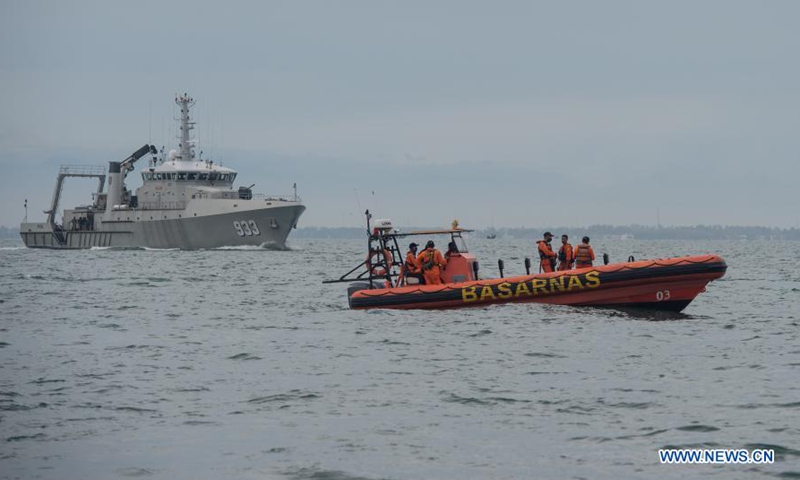
Members of Search and Rescue (SAR) team conduct a search operation at the plane crash site of the Sriwijaya Air flight SJ-182 in the waters of Lancang Island, Jan. 10, 2021. Indonesia's Transportation Minister Budi Karya Sumadi has confirmed the crash of a Boeing 737-500 plane of an Indonesian airlines with 62 people on board that lost contact with the air traffic controller on Saturday afternoon. At a virtual press conference held on Saturday evening, the minister said the Sriwijaya Air flight SJ-182 heading from capital city Jakarta to Pontianak city in West Kalimantan province crashed into the waters off the Seribu District in north of Jakarta. According to him, the plane was believed to have crashed near the district's Laki Island and Lancang Island, part of the Thousand Islands chain. (Xinhua/Veri Sanovri)
The reported crash of a Boeing passenger jet after departure from Jakarta would not have an impact on its market prospects in China; instead, its sluggish recovery in the lucrative market is much more alarming, Chinese aviation analysts said.
On Saturday, a passenger jet, a Boeing 737-500 carrying more than 60 people, crashed into the Java Sea after taking off from Jakarta, Indonesian officials said.
Although the cause of the crash has yet to be determined, the crash again put the troubled US aviation giant under the spotlight. The Boeing 737 Max series was grounded in March 2019 following two deadly crashes that happened within half a year and claimed 346 lives.
So far, there is no evidence showing technical defects or design flaws of the Boeing jet that was lost in the crash, Chinese aviation analysts said on Sunday, noting the 737-500 is an older model than the Boeing 737 Max.
The 737-500 entered service in 1990 and the aircraft that crashed was almost 27 years old, according to Reuters.
"The crash would have no impact on the return of the Boeing 737 Max to China, as the Civil Aviation Administration of China (CAAC) has clearly set out three principles for its return," Lin Zhijie, an independent market watcher, told the Global Times on Sunday.
In October 2020, CAAC head Feng Zhenglin said there are three set rules that were made public, including design changes to the aircraft that must be approved for airworthiness; the full and effective training of pilots, and a clear investigation outcome from the two accidents associated with the Boeing jet.
Amid sporadic coronavirus cases in China, passenger travel is still facing restrictions, Lin noted, adding that with one-quarter of the nation's transport capacity shut, the Chinese market does not have great demand for Boeing aircraft.
"The sluggish recovery of the US aviation giant in the Chinese market is noteworthy," Wang Yanan, an industry expert and chief editor of Aerospace Knowledge, pointed out.
"In particular, if Boeing participates in selling weapons to the island of Taiwan, or carries out any behavior that harms China's national interests, that will have a huge impact on its future in China," Wang told the Global Times.
When that market space is replaced by other aviation companies from Europe, Boeing will lose part of its market share and market recognition in the lucrative Chinese market, he added, suggesting the company consider its strategy seriously.




